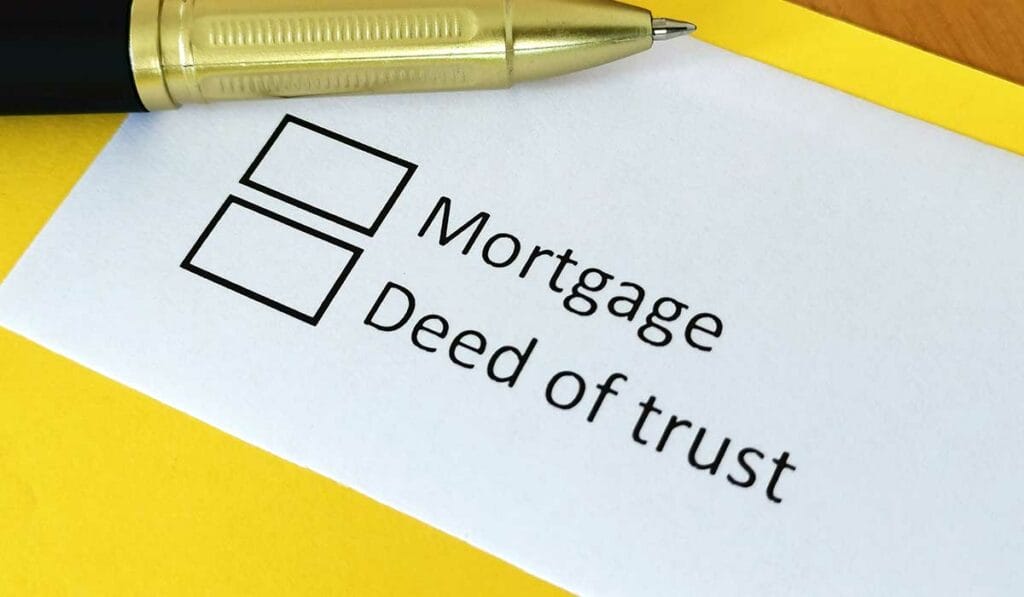
A Complete Guide for Real Estate Investors on Understanding Trust Deed Investing in Arizona
Are you a real estate investor looking for a secure and profitable investment opportunity in Arizona?
Trust deed investing might be the perfect fit for you.
In this guide, we’ll dive deep into the world of trust deed investing in Arizona, covering everything from the basics to the benefits, risks, and best practices.
Key Takeaways:
- Trust deed investing involves lending money to a borrower, secured by real property
- Trust deeds offer high-yield potential, portfolio diversification, and passive income
- Risks include borrower default, market fluctuations, and lack of asset appreciation
- Arizona has specific regulations for trust deed investing and mortgage brokers
What Is Trust Deed Investing in Arizona?

In Arizona, a trust deed is a legal document used in real estate transactions as an alternative to traditional mortgages.
When you invest in a trust deed, you become the lender, providing funds to a borrower who pledges their real property as collateral for the loan.
A third-party trustee holds the title to the property until the borrower repays the loan in full.
Understanding Arizona Trust Deeds: A Deep Dive for Investors

The Parties Involved: Beneficiary (Lender), Trustor (Borrower), and Trustee
There are three main parties in a trust deed investment:
- Beneficiary (Lender): As the investor, you are the beneficiary, providing the funds for the loan and earning interest on your investment.
- Trustor (Borrower): The borrower, or trustor, receives the loan and pledges their real estate as collateral.
- Trustee: An impartial third party, such as an escrow company or title company, holds the legal title to the property until the loan is repaid.
How Trust Deeds Work in Arizona Real Estate Transactions
When you invest in a trust deed, you agree to lend money to a borrower in exchange for a promissory note and a recorded lien on the property.
The borrower makes monthly payments based on the agreed-upon terms, which typically include a fixed interest rate and loan duration.
If the borrower defaults on the loan, you can initiate a foreclosure to recover your investment.
Trust Deed vs. Mortgage in Arizona: Key Differences
While trust deeds and mortgages both create liens on real estate, there are some key differences:
- Trust deeds involve three parties (beneficiary, trustor, and trustee), while mortgages involve two (lender and borrower)
- Trust deeds allow for non-judicial foreclosures, which are faster and less expensive than judicial foreclosures associated with mortgages
Benefits of Trust Deed Investing in Arizona

High Yield Potential and Stable Income Streams
Trust deed investments often provide higher returns compared to traditional investments like stocks or bonds.
Investors can typically expect yields ranging from 7.5% to 13%, making trust deeds an attractive option for generating a stable, high-yield passive income stream.
Portfolio Diversification and Risk Mitigation
By investing in different real estate markets and participating in multi-lender or fractional loans, you can diversify your investment portfolio and mitigate risk.
This strategy allows you to spread your investments across multiple properties and collaborate with other investors, reducing your exposure to any single loan or property.
Security through Property as Collateral
One of the most significant advantages of trust deed investing is the security provided by the real property serving as collateral for the loan.
In the event of a borrower default, you can initiate a foreclosure sale to recover your investment.
By carefully assessing the collateral and maintaining a conservative loan-to-value ratio, you can minimize the risk of losing money on your investment.
Tax Advantages for Arizona Investors
Investors can fund trust deed investments using their retirement accounts, such as a 401K or IRA, potentially offering tax advantages.
This strategy is particularly beneficial for those aiming for higher yields in the 10% to 12% range, as the tax-deferred or tax-free growth can significantly enhance their overall returns.
Passive Investment Without Landlord Responsibilities
Trust deed investing allows you to benefit from real estate without the hassles of property management.
Unlike owning rental properties, you don’t have to worry about finding tenants, collecting rent, or maintaining the property.
Instead, you can enjoy a passive income stream while the borrower handles all aspects of property ownership and management.
Risks and Challenges of Trust Deed Investing in Arizona

Borrower Default and Foreclosure Process in Arizona
One of the primary risks in trust deed investing is the possibility of borrower default. If a borrower fails to make payments, you may need to initiate a foreclosure to recover your investment.
While Arizona allows for non-judicial foreclosures, which are generally faster and less expensive than judicial foreclosures, the process can still be time-consuming and costly.
Importance of Thorough Collateral Assessment in Arizona
To protect your investment, it’s crucial to thoroughly assess the marketability and liquidity of the collateral property.
Factors such as property type, location, and market conditions can significantly impact the ease of selling or refinancing the property in the event of a default.
Single-family homes are generally considered safer and more liquid than raw land or specialized commercial properties.
Navigating Market Fluctuations and External Factors
Like any real estate investment, trust deed investments are subject to market fluctuations and external factors such as economic downturns, natural disasters, or changes in local regulations.
These factors can impact property values and the borrower’s ability to repay the loan, potentially leading to increased default risk.
Lack of Asset Appreciation
While trust deed investments provide a stable income stream, they typically do not offer the potential for asset appreciation.
As a lender, your returns are limited to the interest earned on the loan, and you do not directly benefit from any increase in the property’s value over time.
Types of Trust Deed Investments in Arizona

Individual Trust Deeds
In an individual trust deed, you are the sole investor funding the entire loan for a single property or multiple properties.
This type of investment offers greater control and potentially higher returns, but also carries more concentration risk.
Multi-Lender/Fractional Loans
Multi-lender or fractional loans involve multiple investors pooling their funds to finance a single loan.
This type of investment allows for greater diversification and risk-sharing among investors, but may also result in lower individual returns.
Mortgage Funds
Investing in a mortgage fund provides a more passive approach to trust deed investing.
As a fund investor, you don’t have to worry about selecting individual loans or managing the investment process.
However, mortgage funds typically charge management fees and may offer lower returns compared to direct trust deed investments.
Arizona Regulations for Trust Deed Investing
Arizona has specific regulations governing trust deed investing and mortgage brokers.
Mortgage brokers must be licensed to originate business-purpose loans funded by trust deed investors.
Additionally, brokers may need to register with the Nationwide Multistate Licensing System (NMLS) and report their loan activities regularly.
You are generally not subject to these licensing and reporting requirements as an individual investor.
Best Practices for Trust Deed Investors in Arizona

Working with Reputable Brokers and Loan Servicing Companies
To ensure a smooth and successful trust deed investing experience, it’s essential to work with reputable mortgage brokers and loan servicing companies. These professionals can help you navigate the investment process, conduct thorough due diligence, and manage the loan administration, including collections and foreclosures, if necessary.
Due Diligence and Underwriting Best Practices
Before investing in a trust deed, conduct a thorough due diligence process, including:
- Assessing the borrower’s creditworthiness and experience
- Evaluating the collateral property’s value, condition, and marketability
- Reviewing the loan terms and documentation
- Verifying the title and lien position
By adhering to strict underwriting standards and maintaining a conservative loan-to-value ratio, you can minimize your investment risk and protect your capital.
Acting Quickly on Non-Performing Trust Deeds
If a borrower falls behind on payments, it’s crucial to act quickly to protect your investment.
Work closely with your loan servicing company to initiate contact with the borrower and explore potential solutions, such as loan modifications or repayment plans.
If the borrower is unresponsive or unable to cure the default, be prepared to promptly initiate foreclosure proceedings to minimize your losses.
Real-World Example of an Arizona Trust Deed
Let’s consider a real-world example of a short-form deed of trust in Arizona. The document would include essential information such as:
- Borrower, lender, and trustee names and contact information
- Property address and legal description
- Loan amount, interest rate, and repayment terms
- Transfer of rights and lien on the property
- Insurance and property maintenance requirements
- Occupancy requirements (e.g., borrower must occupy the property within 60 days)
- Default and foreclosure provisions
The deed of trust would be signed by the borrower in the presence of a notary and two witnesses, and then recorded with the county recorder’s office to establish the lien on the property.
Conclusion: Is Trust Deed Investing Right for You in Arizona?
Trust deed investing in Arizona can be a lucrative and secure way to diversify your real estate investment portfolio and generate passive income.
By understanding the benefits, risks, and best practices associated with trust deed investing, you can make informed decisions and maximize your chances of success.
Remember to work with reputable professionals, conduct thorough due diligence, and act quickly to protect your investment in the event of a default.
FAQs
#1. What are the main benefits of trust deed investing in Arizona?
Trust deed investing in Arizona offers several key benefits, including high yield potential, stable income streams, portfolio diversification, security through real property collateral, tax advantages, and passive income without the responsibilities of property management.
#2. How do I get started with trust deed investing in Arizona?
To get started with trust deed investing in Arizona, research reputable mortgage brokers and loan servicing companies in your area. Work closely with these professionals to identify suitable investment opportunities, conduct due diligence, and manage the loan administration process.
#3. What are the risks associated with trust deed investing?
The primary risks of trust deed investing include borrower default, the potential for costly and time-consuming foreclosures, market fluctuations, and the lack of asset appreciation. Thorough due diligence, conservative underwriting, and prompt action on non-performing loans can help mitigate these risks.
#4. How do I evaluate the collateral property in a trust deed investment?
When evaluating the collateral property, consider factors such as property type, location, condition, and marketability. Single-family homes are generally considered safer and more liquid than raw land or specialized commercial properties. Work with experienced professionals to conduct a thorough appraisal and market analysis.
#5. Can I use my retirement account to invest in trust deeds in Arizona?
Yes, you can use your retirement account, such as a 401K or IRA, to invest in trust deeds in Arizona. This strategy can offer potential tax advantages, particularly for investors aiming for higher yields in the 10% to 12% range. Consult with a financial advisor or tax professional to determine if this approach aligns with your investment goals and risk tolerance.
